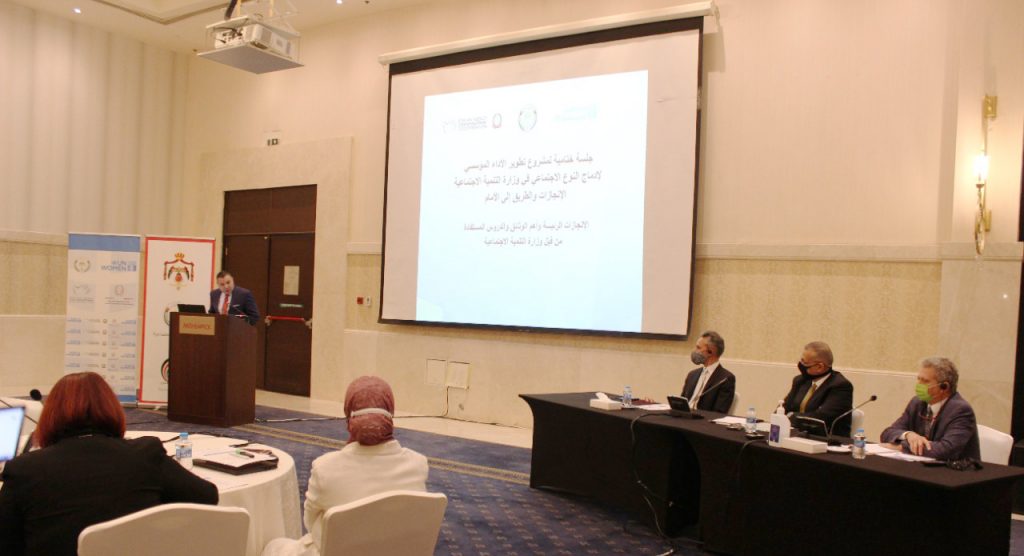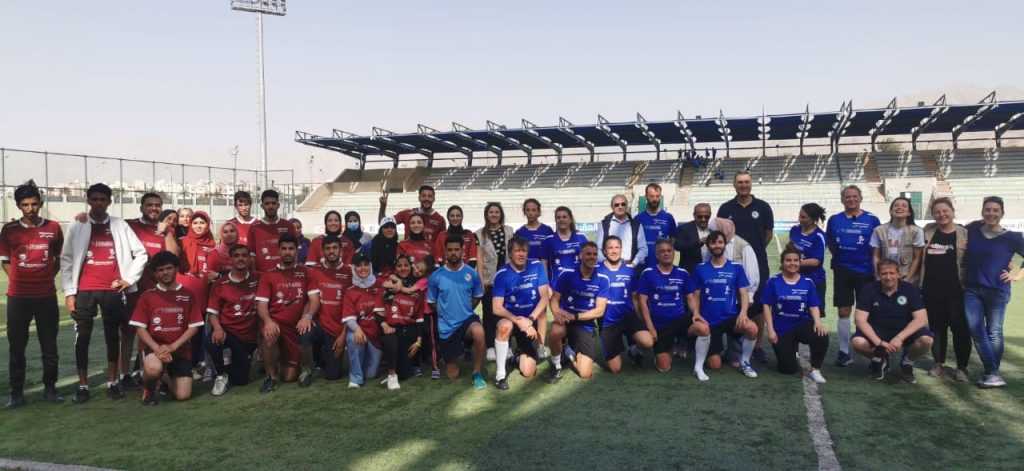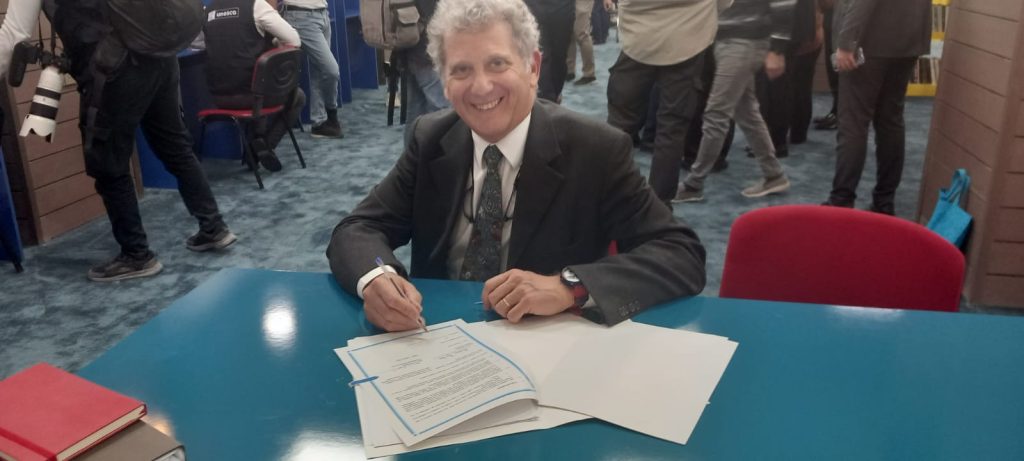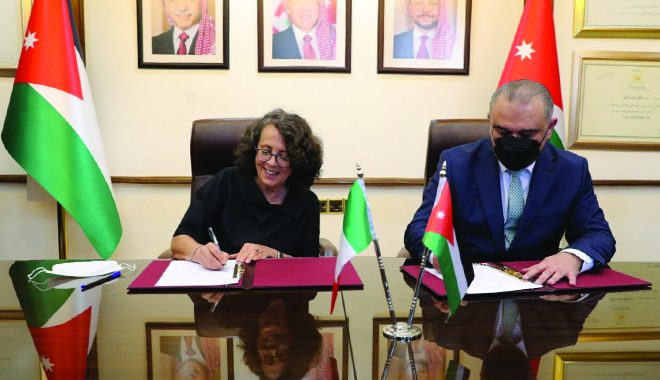Category: notizia ITA
La Vice Ministra degli Affari Esteri e della Cooperazione Internazionale Marina Sereni in visita ufficiale in Giordania
Amman – Durante la visita ufficiale in Giordania, la Vice Ministra degli Affari Esteri e della Cooperazione Internazionale Marina Sereni ha firmato l’Accordo sussidiario di cooperazione con la Giordania 2021-2023 con il Ministro della Pianificazione e della Cooperazione internazionale Nasser Shraideh, preso parte a consultazioni politiche presso il Ministero degli Esteri e degli Espatriati giordano, incontrato i rappresentanti delle Organizzazioni della Società Civile italiane che operano nel paese e visitato i progetti attuati dalla Cooperazione italiana nel campo profughi palestinesi di Hitteen e nel campo rifugiati siriani di Za’atari, in collaborazione con le Agenzie delle Nazioni Unite UNOPS, UNWomen e WFP.
News sulla missione del Vice Ministro degli Affari Esteri e della Cooperazione Internazionale Marina Sereni:
Rainews (IT) – Missione in Giordania per la vice ministra degli Esteri Marina Sereni
Rainews (IT) – Video
Jordan news (EN) – Jordan signs 235m agreement with Italy
Jordan news 2 (EN) – Italy’s Sereni highlights synergy between Jordan-Italy markets
Adnkronos (EN) – Sereni visit to Jordan seeks to cement bilateral ties
Jordan Times (EN) – Jordan a strategic partner — Italian deputy FM
EN | Cerimonia di chiusura: “Institutional Capacity Development for Gender Mainstreaming for the Ministry of Social Development (MoSD)”

Amman, 8 September 2021 – In occasion of the closing ceremony of the project “Institutional Capacity Development for Gender Mainstreaming at MoSD” funded by the Government of Italy through the Italian Agency for Development Cooperation (AICS) and implemented in partnership with the Ministry of Social Development (MoSD) and UN Women, the MoSD Secretary General H.E. Dr. Barq Al-Dmour, on behalf of the Minister of Social Development (MoSD) H.E. Ayman Al Mufleh, affirmed that Jordan achieved significant progress in promoting gender equality and women’s empowerment, in alignment with both its national and international commitments, by adopting key policies, strategies and legislation.
Al-Dmour referred to the Government’s leadership on this agenda through the action of the Inter-ministerial Committee for Women’s Empowerment (IMC) as well as last year’s adoption of the National Strategy for Women (2020-2025). This is considered a guiding framework to inform the formulation of policies that can accelerate women’s empowerment at the economic, social and political level in alignment with broader national priorities.
Additionally, the Government of Jordan, through the IMC, launched a Gender Mainstreaming Policy for the public sector with the support of UN Women.
“Gender mainstreaming leads to strengthened capacities, knowledge and institutions. And these in turn mean more predictable and sustainable returns on financial investments in gender equality and women’s empowerment. UN Women remains committed to working with MOSD and other national institutions to meet the goals of Jordan’s first government gender mainstreaming strategy” said Mr. Ziad Sheikh, UN Women Jordan Representative.
The Head of AICS Amman Mr. Emilio Cabasino added that “on behalf of the Italian Agency for Development Cooperation, we are very glad to celebrate the achievements of such an important initiative and we look forward to discussing the project’s sustainability and its long-term impact, towards the full realization of gender equality and women’s empowerment in Jordan”.
Al-Dmour further explained that promoting gender mainstreaming in institutional performance is an important step towards closing the gender gap as it provides institutions with practical tools and a clear roadmap to ensure equal opportunities in all processes, as well as the development of gender-responsive services in order to achieve gender equality and justice. In particular, it enables institutions to leverage opportunities by transforming gaps into areas of improvement across all sectors.
He also highlighted the Ministry’s efforts in promoting legislation and policies that contribute to achieve justice and provide equal opportunities between men and women. Such approach responds to Jordan’s international commitments to reduce inequalities and discrimination among people living in Jordan on the basis of gender.
Launched in September 2019, the project “Institutional Capacity Development for gender mainstreaming at MoSD” focused on building sustainable institutional infrastructures for gender mainstreaming across MoSD’s plans, strategies, policies and procedures.
Among the project’s accomplishments at the institutional level are: the training manual prepared for the MoS; the practice note on how to formulate performance indicators for gender mainstreaming – which provides a clear methodology for designing gender-responsive internal policies and plans internal policies; and a dedicated guide on how to rollout a gender-responsive public services assessment. As a result of the implementation of these tools, the draft MoSD’s Strategic Plan (2022-2026) has been reviewed from a gender perspective and ten performance indicators on gender equality and women’s empowerment have been added.
Giordania, AVSI e la Cooperazione Italiana in campo con l’Associazione Italiana Calciatori a sostegno dei rifugiati siriani e delle comunità ospitanti

Aqaba, 30 marzo 2022 – Si è svolto oggi presso lo stadio di Aqaba, in Giordania, l’evento di chiusura del Youth-Led Football Program, alla presenza dell’Ambasciatore d’Italia in Giordania Luciano Pezzotti, del titolare della sede dell’Agenzia Italiana per la Cooperazione allo Sviluppo (AICS) di Amman Emilio Cabasino, del responsabile Paese dell’ong AVSI Nicola Orsini e del responsabile del dipartimento junior dell’Associazione Italiana Calciatori (AIC), il campione del mondo Simone Perrotta.
Tra i progetti di protezione sociale attuati in Giordania finanziati dal governo Italiano mediante AICS, AVSI sta realizzando in partnership con Terre des Hommes Italia il progetto “Mujtamai Amani: la mia comunità è la mia sicurezza”, volto a favorire l’inclusione sociale e migliorare il benessere psicofisico di minori e adulti tra i rifugiati e le comunità ospitanti nei governatorati di Aqaba, Mafraq e Zarqa, individuati a seguito di una valutazione di vulnerabilità della popolazione e in coordinamento con il Ministero dello Sviluppo Sociale giordano.
Nella città di Aqaba, AVSI ha realizzato tra le altre attività un programma calcistico rivolto ai bambini e bambine siriani e giordani più vulnerabili, che ha coinvolto in 2 anni oltre 550 bambini/e e 33 giovani allenatori.
“Il programma sportivo, realizzato in collaborazione con l’Associazione Italiana Calciatori, rientra in una collaborazione più ampia siglata a Roma tra la Direzione Generale per la Cooperazione allo Sviluppo (DGCS) del MAECI, l’Agenzia Italiana per la Cooperazione allo Sviluppo e l’Associazione Italiana Calciatori, per proporre lo sport come strumento di integrazione, crescita e inclusione sociale, all’interno di progetti di cooperazione allo sviluppo”, spiega l’Ambasciatore Pezzotti.
L’obiettivo principale del Youth-Led Football Program è stato quello di aumentare la resilienza dei bambini/e e promuovere una cultura di pace che contribuisca a prevenire disagi psicologici e a migliorare la coesione sociale, aspetto di grande importanza in un Paese come la Giordania dove le vite delle persone della comunità locale e dei rifugiati si intrecciano quotidianamente.
“Il coinvolgimento e la partecipazione attiva della popolazione locale e quella di rifugiati rappresentano base imprescindibile per un intervento integrato di protezione psicosociale – afferma il titolare di AICS Amman Cabasino – in cui il rafforzamento delle comunità più svantaggiate è alimentato anche dalla potenzialità del capitale sociale che si costruisce attraverso attività ludico-ricreative”.
“Il calcio è uno strumento di cooperazione tra i popoli – secondo Umberto Calcagno, presidente AIC – Una lingua unica, in grado di favorire il raggiungimento degli Obiettivi di Sviluppo Sostenibile posti per il 2030. Grazie al lavoro dei nostri ex-calciatori e calciatrici del Dipartimento Junior AIC, da anni promuoviamo un modello educativo finalizzato alla crescita del ragazzo attraverso lo sport. La missione in Giordania, come le altre missioni per le quali stiamo per partire, ci ricorda che questo modo di intendere il calcio può rivelarsi utile in tutte le parti del mondo”.
AIC e AVSI condividono lo stesso approccio educativo in cui il bambino è messo “al centro del gioco” del calcio, che rappresenta anche un momento di crescita e apprendimento. L’iniziativa rappresenta in questo senso “un’esperienza positiva sul terreno: AVSI, AIC e AICS hanno lavorato insieme per offrire a questi ragazzi la possibilità di seguire una loro passione, lo sport, e attraverso quella riscoprire il senso della sfida, della crescita, dello sviluppo personale e comunitario”, racconta Giampaolo Silvestri, segretario generale dell’ong AVSI. “Questo è un esempio di quella che chiamiamo partnership per lo sviluppo, unica via percorribile oggi, che mette in rete soggetti istituzionali, privati e del terzo settore, con realtà locali, per fare tutti insieme un passo avanti”.
Le attività sportive hanno permesso ai ragazzi e ragazze coinvolti nel training di acquisire competenze che saranno utili in futuro: lavoro di squadra, cooperazione, comunicazione, leadership, accettazione degli altri e un approccio costruttivo per affrontare sia vittorie che sconfitte. Le ragazze e i ragazzi formati in Giordania hanno così potuto trasmettere attraverso il calcio questi stessi valori a oltre 550 minori che vivono in condizioni sociali e familiari difficili.
Leggi anche:
Firma dell’accordo per l’avvio del progetto “Restoring the Mosul University library”

Alla presenza del Direttore Generale dell’UNESCO, Audrey Azoulay, del Rappresentante dell’UNESCO in Iraq, Paolo Fontani, del Ministro della Cultura iracheno Ahmed Fakak, dell’Ambasciatore d’Italia in Iraq Maurizio Greganti, del Titolare di AICS Amman, Emilio Cabasino, del Rettore dell’Università di Mosul Kossay Alahmadi e del Direttore della biblioteca universitaria, Sayf Al-Ashqar, si è tenuta il 7 marzo 2023 la cerimonia di firma dell’accordo per il progetto “Restoring the Mosul University library”.
Questo importante progetto garantisce l’ottimale funzionamento della biblioteca universitaria a favore di studenti e docenti dell’Ateneo, dopo la notevole ristrutturazione dei locali, avvenuta grazie al fondo multi-donatore gestito da UNDP.
La biblioteca, un tempo, ospitava più di un milione di libri, preziosi manoscritti antichi e pubblicazioni governative. Era soprannominata la “casa della conoscenza” e come tale è stata tra le prime istituzioni prese di mira da Daesh dopo l’occupazione di Mosul nel 2014. È nostro dovere stare insieme al popolo iracheno per rendere nuovamente accessibile questa “casa della conoscenza” e sostenere il buon funzionamento delle sue operazioni.
Le azioni concrete che saranno rese possibili con questo progetto includeranno la corretta disposizione delle opere sulle scaffalature, l’archiviazione e la digitalizzazione dei riferimenti bibliotecari nuovi e preesistenti, il restauro, la digitalizzazione e la conservazione di libri e manuali, il rafforzamento delle capacità pregresse e la formazione del personale della biblioteca per migliorare l’erogazione dei servizi, fornendo un sistema di gestione avanzato. Siamo fiduciosi che ciò darà un contributo significativo alla conservazione della ricca storia e cultura irachena, nonché un impulso alla ripresa della vita culturale ed accademica di Mosul.
I progetti finanziati dalla Cooperazione Italiana in Iraq attualmente in corso hanno un valore di quasi 30 milioni di euro per iniziative di sviluppo e di oltre 22 milioni di euro per interventi di assistenza umanitaria e resilienza, per un totale di oltre 49 milioni di euro. Inoltre, l’Italia ha pianificato di donare circa 30 milioni di euro per i prossimi tre anni, tramite AICS.
Tra i vari settori, il sostegno all’istruzione è stato fondamentale nel nostro portafoglio, sia in collaborazione con ONG italiane che con partner multilaterali.
In collaborazione con UNESCO, siamo attualmente impegnati in un programma tripartito insieme al Qatar, a sostegno dell’istruzione primaria e ad attività volte a favorire il rientro a scuola di ragazzi e ragazze che hanno abbandonato nelle aree di Salah al-Din, Babil e Baghdad (2 milioni di euro a tutt’oggi). I risultati sono stati incoraggianti, anche se un maggiore impegno delle autorità nei confronti delle problematiche specifiche dei bambini che non vanno a scuola e delle scuole rurali porterebbe un impatto più forte e sostenibile: per questo, stiamo esplorando la possibilità di continuare a sostenere questo obiettivo.
AICS ha collaborato con UNESCO anche nella protezione e ricostruzione del patrimonio culturale a Ninive, ed in diverse altre iniziative che l’Agenzia italiana per la cooperazione allo sviluppo sostiene in questo settore in Iraq.

